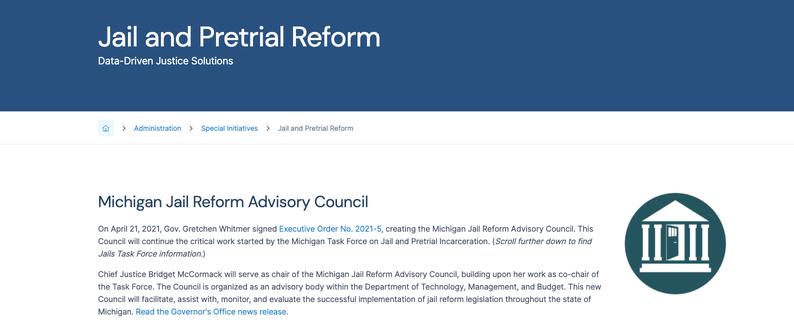The Michigan Jail Reform Advisory Council is seeking public comments ahead of the 9 a.m., Feb. 10 meeting. The meeting is scheduled to be held remotely via Zoom.
The Michigan Jail Reform Advisory Council is an advisory body within the Michigan Department of Technology, Management, and Budget that is comprised of an interdisciplinary group of stakeholders representing state and local governments, law enforcement and community mental health. It is involved in jail reform legislation throughout the state of Michigan. This feedback is expected to assist the council in implementing policy and practice changes, developing educational materials, supporting justice system practitioners and monitoring performance measures.
Related content:The public can either submit comments in writing through a form on council's website or present the comments during the livestream.
The Jails Task Force is a group of criminal justice experts and key stakeholders. In 2019, the task force conducted a year-long study of Michigan’s jails and engaged input from the public in a series of statewide meetings.
A package of 20 recommendations from the task force was passed and signed into law in 2020, supported by a group of bipartisan state senators and representatives. The reforms expand officers’ discretion to issue a citation for low-level offenses, increase the use of alternatives to jail for low-level crimes and incentivize compliance with probation conditions.

Chief Justice Bridget McCormack serves as chair of the council and previously co-chaired the Joint Task Force on Jail and Pretrial Incarceration alongside Lt. Gov. Garlin Gilchrist II. “Michigan has been a national leader in collecting and analyzing data and building bipartisan grassroots support for landmark, innovative improvements of our criminal justice system,” McCormack said in a news release. “The success of the task force depended on public input. Now, we need broad stakeholder input to help implement their recommendations.”
STAKEHOLDERS
Some of those stakeholders include law enforcement and attorneys who have had to learn new rules and change some of the ways they respond to certain cases.
Josh Glass, Manistee City Police chief, previously told the News Advocate the impact of the reforms to officers is that they have to learn the new rules, particularly with arrests. Glass had summarized that one of the criminal justice reforms means changes for when a person is taken to jail and when they receive a ticket.
“Basically (one of the laws) says if someone commits a crime and the offense is a misdemeanor, the penalty for that is less than a year in jail, you should write them an appearance ticket unless it’s one of the exceptions,” he had explained.
Glass previously added that the changes add some challenges for the department since they have educate the officers on the laws, procedural changes and exceptions.
“The bigger task is making sure that our officers have a working understanding of the exceptions,” Glass had said. “Something in law enforcement is that laws are constantly changing. … This profession is constantly changing so we find ourselves in a position (where) we constantly need to keep up with the changing laws, policies, procedures.”
Jason Haag, Manistee County prosecuting attorney, previously told the News Advocate that one change stemming from the reforms that his office was expecting to see was more summonses as opposed to warrants in general.
“Generally, if it’s not an assaultive crime, a domestic violence crime, we’re going to be sending up a summons up to (85th) District Court rather than a warrant,” he had previously said, adding that it means more of a notice to appear, rather than a warrant for the person’s arrest.
Haag had said there are exceptions to that new change and allowances for discretion as well, but that in some cases where there used to be mandatory minimum jail sentences that no longer require jail time.
Those may be more likely to seek alternatives such as fines, community service, probation, electronic monitoring and other routes instead.
More about the council, previous meetings that are video recorded and the Feb. 10 event can be found online at courts.michigan.gov/administration/special-initiatives/jail-advisory-council.




